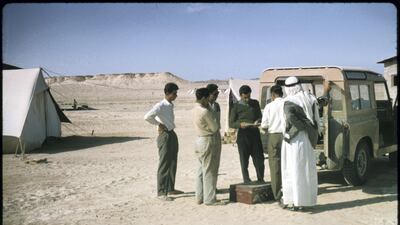When David Riley arrived in Abu Dhabi in 1962, he made arduous overnight journeys to Tarif and Jebel Dhanna in the Western Region. His main job was to oversee a mobile banking service for construction workers there. And it was all done from the back of a Land Rover.
"The journey to Jebel Dhanna was hell. If you weren't roasted alive in the Land Rover, you were shaken to bits, driving across a very rutted and hard-baked sabkha [salt flat]. The only way was 'foot hard down' and hang on! Happy days!"
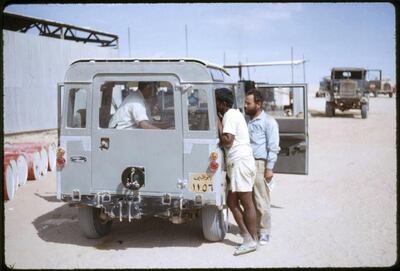
Now 77 and retired, Riley recalls these freewheeling days when he worked as an accountant with the British Bank of the Middle East (now HSBC). It was a time when Abu Dhabi's airport was a sandy landing strip; freshwater was delivered from Dubai on a barge and the British political agent, or ambassador today, held informal curry lunches on his boat.
Riley had been working for the Midland Bank in the UK in 1962 when he heard the British Bank of the Middle East was advertising for staff. "It just appealed to me. It was the right time and I hadn't gone to university," he says. The job was a three-year tour and, via a short posting in Kuwait, Riley arrived in Abu Dhabi that November. He was just 22.
The year was an important one for the sheikhdom. The first shipment of oil left Das Island for global markets in July. Yet many opportunities created by the rapid growth of the oil business had yet to trickle down to those born here.
It was into this environment that Riley landed. There were no roads, no proper medical facilities and no telephones. There was only a basic stone jetty and no facilities for large ships. Electricity was provided by generators. Water was the most expensive commodity.
Riley recalls that when he arrived, drinking water was brought down the coast from Dubai on a barge. The monthly cost of freshwater for the bank manager's house and Riley's accommodation was £100 a month in 1962 prices. "When you consider that a carton of 200 Rothmans cigarettes cost the equivalent of 45 pence, then water was like gold and probably more expensive."
A desalination plant that opened in 1963 helped to alleviate the situation. Basics such as sugar, tea, condensed milk and vegetables could be purchased in the four or five hole-in-the-wall shops. But items such as steak, a personal favourite of the branch manager, had to be flown in on the daily Gulf Aviation (now Gulf Air) flight from Bahrain. The strip could become waterlogged and night flights were nearly impossible.
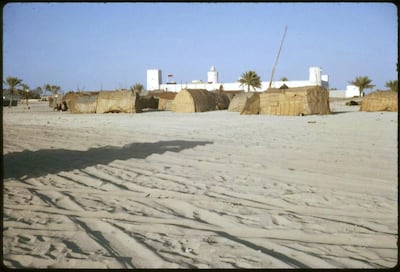
"Everybody used to go up to the landing strip – it was a very social occasion. There'd be mail on it, newspapers, food and you'd see who was coming in because there was a constant stream of business people," says Riley.
Incredibly, the old terminal building still survives to this day within the grounds of Abu Dhabi Media off Muroor Road and 17th Street.
Despite the increase in travellers and the expanding oil industry, it was not until 1963 that Abu Dhabi's first hotel was built. Run by a Greek couple, the Beach Hotel sat roughly where the Sheraton Abu Dhabi is today and was used mainly by expatriate business people.
In the same year, Spinney's opened a cold store in Abu Dhabi solving many of the food supply issues. Opportunities also started to trickle down to the people who deserved it most. For example, the postal system had been run by the British but, in 1963, Ruler of Abu Dhabi Sheikh Shakhbut bin Sultan Al Nahyan decided to take it over. Sheikh Shakhbut summoned one of the bank's experienced local cashiers, Ali Bhutti, who was promptly appointed new postmaster of Abu Dhabi. "In those days, you did not refuse the wishes of the Ruler," says Riley.
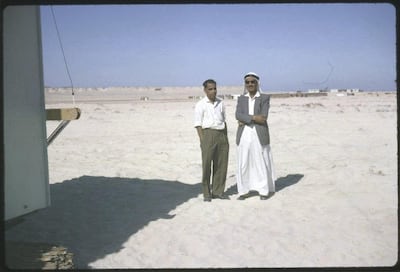
Three banks operated in Abu Dhabi at this time. There was the British Bank of the Middle East, which opened in 1959; Eastern Bank (now Standard Chartered); and Ottoman Bank (also now part of Standard Chartered). Riley's bank offered a fortnightly service to construction sites and oil camps at Tarif, Jebel Dhanna and Das Island. Riley and his team brought currency for companies and also sold bank drafts to workers. From India, Iran, Pakistan and Lebanon, the workers exchanged their currency for drafts to send home to their families. About 95 per cent of the bank's business was selling these drafts.
Today, Jebel Dhanna is still a stressful 286 kilometre drive from Abu Dhabi, and that's on a motorway taking only two-and-a-half hours.
Riley describes the journey then as nothing short of horrendous, taking five hours across a mud-baked coastal road with one night spent in Tarif on the way. Oil was sometimes poured on the road to make it smoother, with the tactic being to drive as quickly as possible to minimise the bumps. Riley also flew to Das Island regularly, which was the base of all offshore oil exploration operations.
As the bank's visits were advertised in advance and Riley carried large amounts of cash it seems remarkable there was never any hint of danger. Apart from one occasion.
When a driller was held up in the desert a week before Riley was due to go out on a visit, he promptly bought a rifle, much to the annoyance of the British political agent Colonel Hugh Boustead. "It's alright for you – you've got a whole platoon of Trucial Oman Scouts. I've got nothing," he recalls telling Boustead, who was the equivalent of an ambassador today.
"So I walked into the Santa Fe drilling company outside Tarif carrying this rifle and they were all Texans and they nearly wet themselves. I think I got referred to as 'Shotgun Dave' after that."
Riley chronicled his time here with an extraordinary series of photographs. Taken on a basic 35 millimetre German Voigtländer, the shots are crisp and colourful, showcasing the transformation that oil was bringing, but also the poverty that lingered.
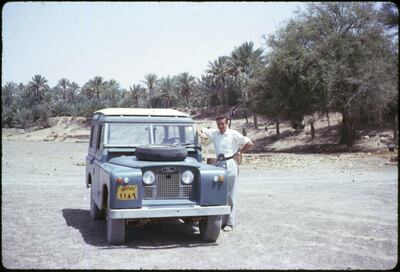
In the pictures from the early 1960s we can see how many people still lived in barasti, or palm frond, houses. Several had rudimentary wind towers. Other shots show traders selling basic foodstuffs in Al Ain’s souq. The pictures also serve up some context for today’s residents. When heavy rains lashed the UAE in 2015 causing major floods, it felt to many that the country had never seen such rain. But one photograph, shows the aftermath of a storm on the Abu Dhabi quay, with recently-unloaded cargo damaged by gales and a sea surge.
Outside of work, Riley recalls a vibrant expatriate social circle. Numbering about 40 or 50 Europeans when he arrived, there were regular parties and dinners. Weekends were often spent water-skiing, fishing or trips to Bahrain, which was then a more established centre. On occasion, Riley had lunch on Col Boustead's boat. "He was a character. He used to go out into the desert on treks and always carry a tin bath as he liked a bath. And he would carry proper silver service. He did it in style."
When Col Boustead retired, Sheikh Zayed, future Founding Father of the UAE, gave him a house in Al Ain. There, he looked after Sheikh Zayed's stable of horses until his death in 1980. Riley recalls a lunch that he attended in the presence of Sheikh Zayed who was then based in Al Ain. "He was very pleasant and quite approachable," he says.
Riley left Abu Dhabi in August 1964, after deciding to return to the Midland Bank and the UK permanently. By 1966, Sheikh Zayed had become the Ruler of Abu Dhabi. Electrification began in 1967, unification was on the horizon and a country was on the move. But Riley had had a front row seat to this transformation. Fifty-five years on, his photographs and memories have documented a time that needs to be recorded.
_______________
Read more:
Early days of the UAE: Honor Cowell recalls her life as one of the first female expats in Abu Dhabi
How Abu Dhabi's old buildings are a record of the past
Former expat shares tales from early years of Dubai in her blog
_______________
